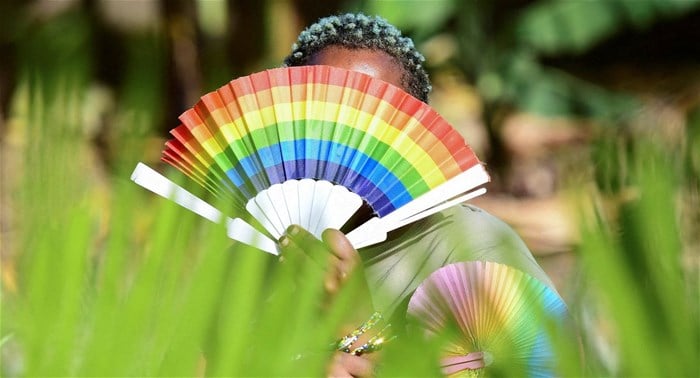Uganda's President Yoweri Museveni has asked lawmakers to make clear in a proposed anti-homosexuality law that it is not criminal to merely identify as gay, as part of an attempt to tone down a bill that has drawn international condemnation.

File photo: Quin Karala, 29, a member of the lesbian, gay, bisexual, transgender, intersex and queer (LGBTQ) community and a single mother of one poses for a picture with rainbow colours at the offices of Rella Women's Empowerment Program, for LGBTQ rights advocacy, after a Reuters interview in Kulambiro suburb of Kampala, Uganda 4 April 2023. Reuters/Abubaker Lubowa/File Photo
Last month, lawmakers in the east African country overwhelmingly passed the proposed legislation, potentially one of the world's harshest anti-LGBTQ laws, and sent it to the president for approval.
The planned law, or bill, criminalises a broad range of homosexual activity, including promoting or abetting the lifestyle and imposes stiff penalties including death for so-called aggravated homosexuality.
The law has stoked widespread criticism from human rights defenders, Western governments and corporations.
Thomas Tayebwa, parliament's deputy speaker, read to lawmakers a letter Museveni had written to the parliament's speaker on Tuesday in which he outlined his reasons for returning the bill and what changes he wanted.
In the letter Museveni said it needed to be clear and distinguish between someone who professes a homosexual lifestyle and someone who actually commits homosexuals acts.
"The proposed law should be clear so that what is thought to be criminalised is not the state of one having a deviant proclivity but rather the actions of one acting on that deviancy," Museveni wrote in the letter.
"The bill should be reviewed and include a provision that clearly states ... a person who is believed or alleged or suspected of being a homosexual who has not committed a sexual act with another person of the same sex does not commit an offence."
He also asked lawmakers to remove provisions that impose a duty on citizens to report acts of homosexuality because it would create "constitutional challenges" and also be a source of conflict in society.
He asked lawmakers to include a provision to facilitate rehabilitation of homosexuals who voluntarily renounce the practice. The country's deputy attorney general has also advised that a mandatory death penalty also be removed from the law.
Tayebwa referred the bill back to parliament's legal affairs committee which will process and report on it and return it to the full House for fresh debate and passage.
Once it is passed again by the full House it will be returned to the president for approval.



















